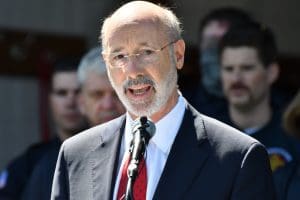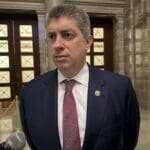Pennsylvania voters limit governor's role in public health following GOP scare campaign
Republicans in the Pennsylvania Legislature and those aiming to replace Gov. Tom Wolf in 2023 have made Wolf their top political target, repeatedly attacking his stewardship during the pandemic.

Pennsylvania voters became the first in the nation to curb their governor’s emergency powers, approving constitutional amendments proposed by Republican lawmakers angry over Democratic Gov. Tom Wolf’s handling of the COVID-19 outbreak.
The vote on Tuesday’s statewide primary ballot came as Republican lawmakers across the country have sought to roll back the emergency powers governors wielded during the COVID-19 pandemic.
Republicans see the referendum as a victory with strong political overtones, as the state gears up for a wide-open governor’s race in 2022 and Wolf leaving office after two terms.
Republicans in the state Legislature and those aiming to replace him in 2023 have made Wolf their top political target, repeatedly attacking his stewardship during the pandemic, including his orders shuttering businesses, sending students home for online schooling, and ordering masks worn outside the home.
“Last night, Pennsylvanians voted to reject Democrat Gov. Tom Wolf’s overreach of executive powers after his failed COVID response — a clear sign of accountability coming in 2022,” Republican National Committee chair Ronna McDaniel tweeted Wednesday morning.
Wolf has largely lifted his orders to stem the spread of the coronavirus, with the remaining limitations on crowd capacity lifting May 30 and a mask-wearing mandate for the unvaccinated that tracks federal guidance, until the state reaches a 70% vaccination rate.
In a relatively muted statement Wednesday, Wolf’s office maintained that the disaster declaration does not affect orders designed to prevent COVID-19 from spreading.
Rather, it relaxes regulations for medical professionals, gives the state access to federal emergency aid, and streamlines National Guard deployments, among other things, his office said.
With votes still being counted Wednesday, support for the two questions led with almost 54% of the vote, with 76% of precincts reporting. More than 2 million ballots were cast, still less than a quarter of the state’s 8.7 million registered voters.
The questions asked voters to end a governor’s emergency disaster declaration after 21 days and to give lawmakers the sole authority to extend it or end it at any time with a simple majority vote.
Before Tuesday, the constitution required a two-thirds majority vote by lawmakers to end a governor’s disaster declaration and, legally, the governor could issue an emergency declaration for up to 90 days and extend it without limit.
Wolf had opposed them, calling them a threat to a functioning society that could prevent a fast and wide-ranging response to increasingly complicated disasters.
But governors have no say in what proposals lawmakers put on ballots to amend the state constitution.
Republicans accused Wolf of fear-mongering and had history on their side: The last time voters rejected a ballot question was in 1993, according to information provided by the state.
The amendments cannot take effect until the state certifies the election result, which could take until early June. In the meantime, the governor’s emergency disaster declaration for the pandemic was set to expire midnight Thursday, the governor’s office said.
That raised the question of whether Wolf will renew it. His office would only say that it will “soon connect” with the Legislature about an extension.
Sending the questions to the ballot — including a constitutional amendment to override a law — was the only way for Republican lawmakers to reel in Wolf’s authority, or that of future governors.
Wolf had vetoed more than a half-dozen different bills designed to restrict his authority under a disaster declaration.
Courts rejected repeated attempts to end the governor’s disaster declaration or lift his orders, and Democratic lawmakers largely stuck with Wolf, leaving Republicans without a large enough majority to override his actions.
In any case, the effect is in dispute.
Republicans claim the governor cannot order shutdowns without an emergency declaration in effect. Wolf has disagreed, saying that authority during a public health emergency rests on separate public health law and is unaffected by the ballot questions.
As a result, it may end up in court.
Recommended

Ohio Gov. DeWine said he didn’t know of millions in FirstEnergy support. Is it plausible?
Ohio Gov. Mike DeWine’s claim to not know about the millions an Akron utility spent supporting his 2018 campaign for governor simply isn’t credible, an Ohio political scientist said in a recent interview. A spokesperson for DeWine pushed back. FirstEnergy provided that support, then spent more than $60 million to pass and protect a $1.3 billion ratepayer-financed […]
By Marty Schladen, Ohio Capital Journal - April 29, 2024
Missouri governor hopeful Bill Eigel rejects affordable childcare proposal
Eigel has previously supported stripping funds from public schools and once opposed an expansion of early kindergarten.
By Jesse Valentine - April 15, 2024
Montana Gov. Greg Gianforte hosts event with religious extremist
J.P. De Gance is the founder of Communio, an organization that uses social media marketing tools to push a far-right agenda.
By Jesse Valentine - March 27, 2024







































































